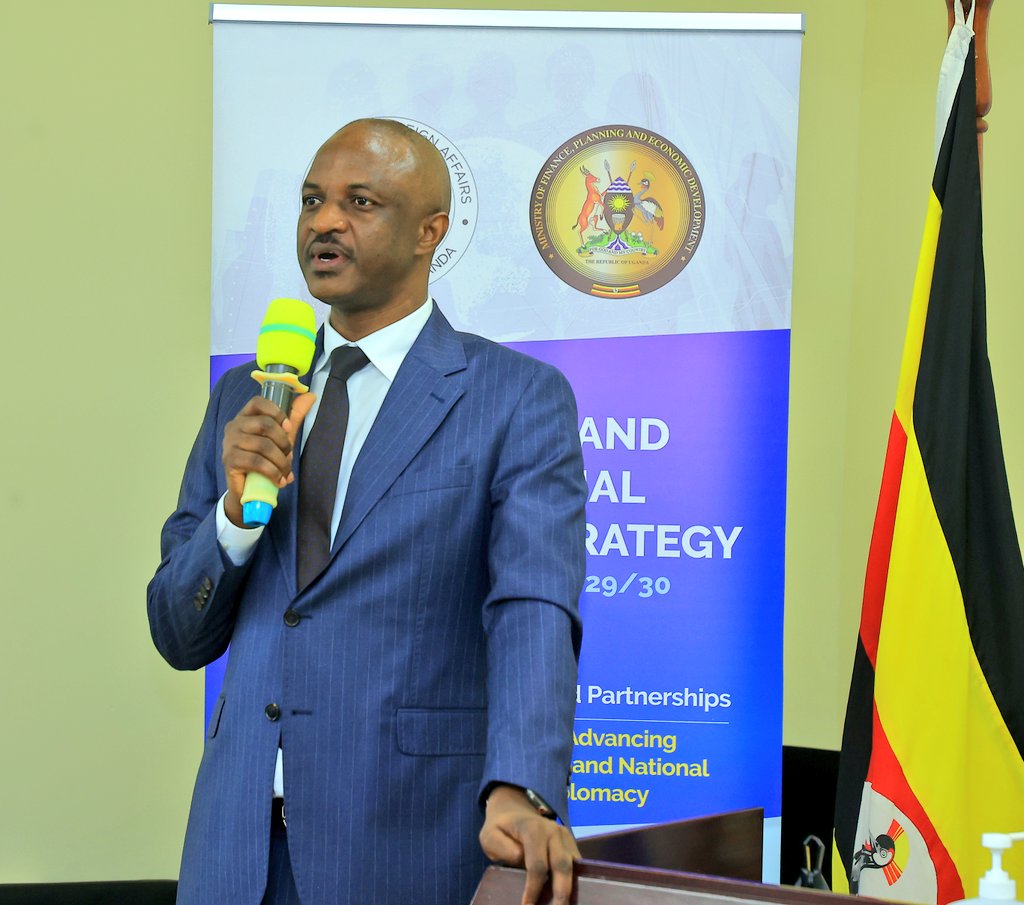Uganda assures ‘solid’ ties with IMF, World Bank; eyes new credit & investment boom
In a significant development, the Minister of State for Foreign Affairs (International Relations), Oryem Henry Okello, alongside PSST Ggoobi, Permanent Secretary for Foreign Affairs Vincent Bagiire, and several ambassadors, officially launched the Economic and Commercial Diplomacy (ECD) Strategy.

The Permanent Secretary and Secretary to the Treasury (PSST) in the Ministry of Finance, Planning, and Economic Development, Ramathan Ggoobi, has assured the nation’s diplomatic corps that the country maintains a robust and healthy relationship with the International Monetary Fund (IMF) and the World Bank, signaling renewed confidence and engagement with multilateral lenders.
Speaking at the Annual Ambassadors’ Conference underway in Gulu City, Ggoobi revealed that Uganda is actively negotiating a new Extended Credit Facility (ECF) Program with the IMF, anticipated to be presented to the IMF Board following the general elections in early 2026.
Regarding the World Bank, he stated, “Our relationship with the World Bank is now fully restored. We have presented new projects to the Board. The Bank has allocated more concessional financing for a number of transformative projects,” underscoring a significant step towards resumed development funding.
Ggoobi then pivoted to the imperative role of Uganda’s diplomatic missions abroad, urging them to concentrate their efforts on three key deliverables: attracting Foreign Direct Investments (FDI) and diaspora remittances, expanding export markets, and boosting tourist arrivals.
He painted Uganda as an attractive investment destination, declaring, “Tell everyone who cares to listen that apart from the gifts of nature, Uganda offers peace, easy taxes, and a tolerable administration of justice.” He highlighted a high average return on investment of 14% and an impressive 30% average return on equity for listed companies, alongside a stable and well-managed macroeconomy.
The PSST emphasized the government’s pro-private sector stance, detailing “generous incentives” and strengthened legal and regulatory frameworks, including amendments to the Company Act to enhance corporate governance. Additionally, he pointed to Uganda’s strategic access to the vast EAC, COMESA, and AfCFTA markets, collectively representing a billion people and a GDP of approximately USD 3 trillion.
On the broader economic front, Ggoobi noted that Uganda’s economy is evolving with increasing complexity for its income level. He cited projections from the Growth Lab at Harvard University, which forecast that Uganda’s economy is poised to grow more rapidly in the decade leading up to 2035 than any other of the 145 countries tracked by the institution.
Earlier in the conference, Ambassador Charles Ssentongo commended the Ministry of Finance, Planning and Economic Development for empowering diplomatic missions to align with the country’s ambitious Tenfold Growth Strategy.
Economic and Commercial Diplomacy Strategy Launched
In a significant development, the Minister of State for Foreign Affairs (International Relations), Oryem Henry Okello, alongside PSST Ggoobi, Permanent Secretary for Foreign Affairs Vincent Bagiire, and several ambassadors, officially launched the Economic and Commercial Diplomacy (ECD) Strategy.
This new blueprint is designed to coordinate and strategically engage with the global economy, aiming to expand market access and penetration for Ugandan goods and services, attract transformative investments in key growth sectors, and foster international partnerships for sustainable development.
The Annual Ambassadors’ Conference 2025 is being held at Gulu University from August 29th to September 6th, under the theme “Strengthening the Foreign Service’s Contribution to National Development.”
The presence of Chief Coordinator Gen. Salim Saleh as the Guest of Honor underscores the government’s commitment to strong leadership and diplomacy in shaping Uganda’s development trajectory, reinforcing the crucial link between foreign policy, national development, and strategic leadership.







